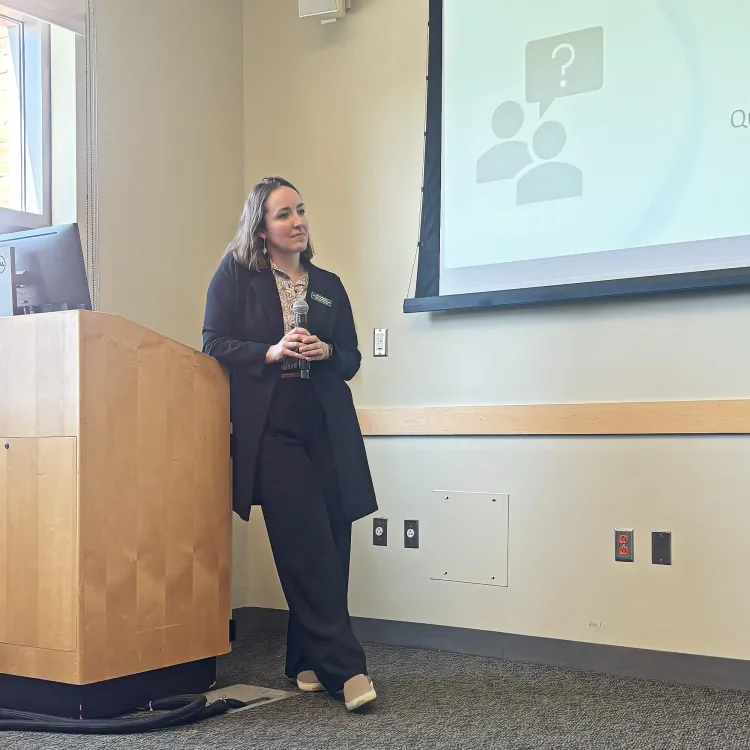On April 23, the University of Vermont hosted the 2025 Nursing Evidence-Based Practice Colloquium at the Davis Center. The colloquium highlighted the scholarly projects of 21 students enrolled in UVM's Doctor of Nursing Practice (DNP) and Clinical Nurse Leader (CNL) programs, showcasing their capacity to apply the knowledge gained throughout their degree programs to address challenges in academic and practice settings, health care systems, and the community. The annual colloquium provides a platform for students to present their work while engaging with peers, faculty, and healthcare professionals, reinforcing UVM's commitment to advancing nursing practice through evidence-based education, research, and academic practice partnerships.
For her project, "Reducing Lethal Means Access Through Education and Safety Tools Distribution," Jillian Leikauskas, M.P.H, RN distributed safety kits, including medication lock boxes and cable gun locks, along with fact sheets, to primary care providers. Leikauskas’ findings led her to advocate for more training and integration of safety tools into holistic safety discussions beyond times of risk, and the identification of barriers Vermont providers face in discussing firearms with patients. Leikauskas' project, which she will present later this week at the Suicide Research Symposium, underscores the urgent need for comprehensive strategies to reduce lethal means access and improve provider comfort in discussing these issues. Her faculty advisor for the project was Jean Pelski, Ph.D., APRN.
Other student projects presented at the colloquium covered a variety of health topics relevant to Vermonters, including: addressing anxiety screening for children in the pediatric primary care setting, using AI to generate culinary medicine resources for migrant workers with chronic diseases, improving health outcomes for people with chronic obstructive pulmonary disease, elevating LGBTQ+ healthcare using data collection in primary care, developing a protocol for pediatric lead screening in rural Vermont, improving primary care clinic screening for substance use disorder, improving vaping screening in adolescent patients, and more.

“As nurses graduate and begin practice with the DNP, they can be the link between research findings and clinical practice,” said Dr. Rosemary Dale, Associate Dean for Clinical Practice in CNHS, Chair of the Department of Nursing, and the Holly and Bob Miller Endowed Professor of Nursing Leadership. “The nurse prepared with the clinical doctorate is able to transfer research findings into practice guidelines, policies, or protocols that are applicable in real-world settings.”
UVM's Doctor of Nursing Practice program prepares students for national certification as nurse practitioners, offering tracks in Adult-Gerontology Nurse Practitioner (AGNP) and Family Nurse Practitioner (FNP). The program emphasizes personalized attention from expert faculty clinicians, small class sizes, and a commitment to inclusion. Students benefit from hands-on clinical experience through collaborations with UVM's Academic Medical Center and NP-led Appletree Bay Primary Care. The DNP curriculum includes 69.5 to 76 credit hours of coursework, 800 to 870 hours of clinical experience, and an additional 240 practicum hours related to the DNP project. Students with a bachelor's degree in nursing can complete the program in three years, while those with a master's degree can finish in approximately two years. The program also offers specialization in primary care or executive nurse leadership for postgraduate students. Upon completion, graduates are eligible to sit for the national Advanced Practice Registered Nurse (APRN) certification exam.
For more information about UVM's DNP program, contact the College of Nursing and Health Sciences at cnhs@uvm.edu.

